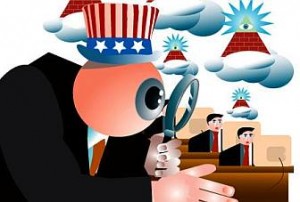Top government and private security experts also find personal cybersecurity to be a challenge in lieu of the growing popularity of social media networking.
Everyone has eyes on you in the cyber world. Even the brightest minds in the digital world are in a constant struggle to ward off hackers from intruding into their personal lives.
Top government and private-sector computer security experts at the Reuters Cybersecurity Summit this week advised everyone to be paranoid, dubious and apprehensive.
“There are two types of people: those who’ve been hacked and those who don’t know they’ve been hacked,” said former Homeland Security Secretary Michael Chertoff, sharing an adage commonly repeated in cybersecurity circles.
Cybersecurity experts use the latest technological innovations to defend networks from outside threats in their professional lives. However, when it comes to personal protection, even security experts are surprisingly indifferent, and opt for low-tech methods.
Chertoff started with his own private consultancy after leaving the government in 2009. He says he did not use his email during office so as to cut off all access to his network, so does the existing Homeland Security Secretary Janet Napolitano.
The manufacturers of the largest selling anti-virus Eugene Kaspersky claims that he uses a six-year-old Sony Ericsson cellphone in order to fend off threats than the latest next-gen smartphones.
“I’m a conservative man,” said Kaspersky. His Moscow-based Kaspersky Lab is doing some intensive in-depth research on the Stuxnet virus and other malicious software. “I am paranoid. I suspect every link and every email.”
Other cybersecurity experts advise people not to install sensitive data onto their hard drives, refrain from putting sensitive and personal data on social media.
The most commonly used tool by hackers is phishing. Hackers recently gained access to a Twitter account of the Associated Press via a phishing campaign to send a phony message last month about bombings at the White House, which led to a turmoil in the financial markets.
Henceforth, the North American Electric Reliability Corp, which administers the security of the electric grid, makes its employees go through a litmus test every quarter with a fake phishing email, according to CEO Gerry Cauley.
Experts emphasize on the importance of being careful about putting personal details online, though social media is here to stay.
“If you’re living in the modern world if you’re not in the social media, you don’t exist,” said Kaspersky. “But please, keep your mind switched on, don’t post personal stuff.”
But then on the flip side social media also facilitates cyber investigators as well as hackers. Crowdstrike announced that it has build profiles of many hackers with their photographs, courtesy of the social media.
“We often bemoan, outside of cybersecurity, that we don’t have privacy anymore, that Google and Facebook know so much about us,” said CrowdStrike Chief Technology Officer Dmitri Alperovitch.
“That’s true for the adversaries, too, right? They’re all on social networks, they’re all on Twitter, accumulating a digital trail that often goes back years”
Source-ThinkDigit








